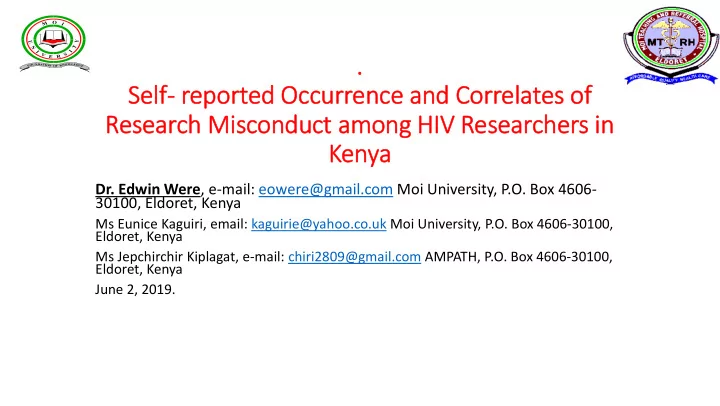

. Self Self ‐ re reported Occurr Occurrence ence and and Corr Correl elates es of of Resear search ch Mi Miscond onduct ct am among ong HI HIV Resear searcher chers in in Ke Keny nya Dr. Edwin Were , e ‐ mail: eowere@gmail.com Moi University, P.O. Box 4606 ‐ 30100, Eldoret, Kenya Ms Eunice Kaguiri, email: kaguirie@yahoo.co.uk Moi University, P.O. Box 4606 ‐ 30100, Eldoret, Kenya Ms Jepchirchir Kiplagat, e ‐ mail: chiri2809@gmail.com AMPATH, P.O. Box 4606 ‐ 30100, Eldoret, Kenya June 2, 2019.
Moi University Teaching Hospital, Kenya
Disclaimer • This work is supported through Award Number G11TW010554 from the Department of Health and Human Services National Institutes of Health, Fogarty Institute Center. The content of this abstract is responsibility of the authors and does not necessarily represent the official views of the Fogarty Institute Center, the National Institutes of Health or the US Department of Health and Human Services.
EW1 Definitions Research misconduct means fabrication, falsification, or plagiarism in proposing, performing, or reviewing research, or in reporting research results. Does not include honest errors or differences in opinion. The National Science Foundation, USA recognizes other Detrimental Research Practices (DRPs) aka Questionable Research Practices (QRPs) but focuses on FFP Sources 1.https://ori.hhs.gov/definition ‐ misconduct 2.National Academies of Sciences, Engineering, and Medicine. 2017. Fostering Integrity in Research. Washington, DC: The National Academies Press. doi: https://doi.org/10.17226/21896. Research Integrity principles include reliability, honesty, respect and accountability Source: ALLEA (All European Academies) : The European Code of Conduct for Research Integrity (Revised ), 2017. 4
Occurrence of RM Joseph Ana et al , Research Misconduct in Low ‐ and Middle ‐ Income Countries: PLoS Med. 2013 Mar; 10(3): e1001315. • 2% – 14% of scientists may have fabricated or falsified data • 33 – 75% may be guilty of “questionable research practices.”
Occurr Occurrence ence of of RM RM Okonta et al, Prevalence of Scientific Misconduct in Nigeria, Dev World Bioeth. 2013 Dec; 13(3): 10.1111/j.1471 ‐ 8847.2012.00339.x. • Used SMQ ‐ R tool • 68.9% had committed at least one RM • 42% of researchers had committed falsification of data or plagiarism
• Reviewed 2047 retracted biomedical journal articles indexed in Pubmed 2012 (1975 ‐ 2012) • 21.3% due to error • 67.4% due to misconduct 43.4% fraud (Fabrication and falsification • • 14.2% duplicate publications 9.8% plagiarism • • 10 fold increase in fraud since 1975 7
Obj Object ctive • Estimate the occurrence of self ‐ reported RM among HIV researchers in Kenya • Describe factors associated with self reported RM.
Methods • Cross ‐ sectional survey • Study population: HIV research investigators and coordinators approved by MTRH, KNH & Moi IREC and listed on NACC’s Maisha Maarifa database • Census sample of 667 respondents • Viewed an informed consent document before being invited to complete survey tool anonymously • SMQ ‐ R instrument (Broome etal, 2005) used – as an online survey on REDCAP platform • The prevalence of self ‐ reported personal experience with RM and associated factors assessed using Fishers Exact or Chi square tests were derived. 9
Methods ctd • Used a modified Scientific Misconduct Questionnaire ‐ Revised (SMQ ‐ R) tool to estimate the prevalence of RM. • The tool assesses perceptions of various stakeholders on RM
Response Rate • 100 out of 667 (15%) completed the survey after 3 reminders.
Frequency & correlates of Awareness of RM RM in the last 5 years. Awareness of RM in the past 5 Correlates of Awareness of RM in last 5 years years (N=87) 47.6 52.4 Yes No 12
Frequency & Correlates of Self Reported Ever involvement in any RM RM Ever ‐ involvement in Correlates of ever ‐ involvement in any RM RM (N=80) 31.70 % 68.30 % Yes No • Okonta et al,2013: Nigeria ‐ 68.9% 13
Self ‐ Reported Ever ‐ involvement in & correlates of FFP FFP. Correlates of ever involvement in FFP Ever ‐ involvement in FFP (n=79) 35% Yes 65% • Fanelli, 2009: HICs – 1.79% FFP & 33.7% QRPs on self report • Higher frequency when reporting on colleagues 14
Conclusions • Awareness of cases of RM, personal involvement in any RM and, specifically, FFP were frequent. • Reports of RM were associated with: • Experience in research, • Perception of effectiveness of institutional rules and procedures relevant to RM and • Perceived severity of related penalties, were associated these reports.
Recommendations • Research and Academic institutions should develop and disseminate widely rules & regulations governing responsible conduct of research. • Such regulations should have clearly defined procedures and sanctions for managing research misconduct.
Acknowledgements • NIH • Kenyan HIV Researchers • NACOSTI, Kenya • NACC, Kenya
Thank you
Recommend
More recommend